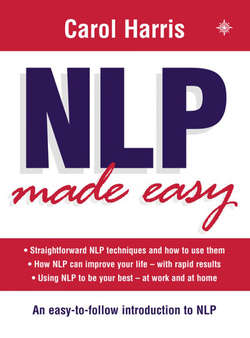Читать книгу NLP Made Easy - Carol Harris - Страница 7
Chapter 1 What is Neuro-Linguistic Programming?
ОглавлениеThis chapter introduces you to Neuro-Linguistic Programming (NLP) and gives an outline of where it originated, what it covers and how it works, together with some of its links with other disciplines. It also considers popular misconceptions about NLP and gives a brief guide to ongoing developments in the field.
You probably already ‘do’ NLP and are likely to know a good deal about some of its approaches. This is because NLP has its roots in real-life behaviour, rather than in theory and research. NLP is about how people become successful at things; how they achieve what they aim for and enhance their lives. NLP encompasses a wide variety of processes and techniques, and has an overriding emphasis and approach – that of curiosity, exploration and action. NLP can offer you many things, but it helps if you are willing to be adventurous, open to change and fascinated by life and all that it brings.
NLP’s main aim is to help people get better at what they do. Its focus on performance has a number of principles, some of which are as follows:
Excellence in performance can be modelled (analysed) and transferred from one person to another.
High performance requires both the development of skills and development of corresponding mental and physical states.
Mental and physical states can be broken down into small measurable elements and modified to achieve desired results.
What distinguishes NLP from many other disciplines is its focus on modelling (see Chapter 3). Briefly, modelling is the elicitation of sets of patterns; in NLP, patterns which demonstrate how people achieve excellence in performance. These patterns can be copied by others in order to replicate the achievements of high performers. Characteristic features of NLP are its specific techniques for analysing the components of performance, especially how the mind processes information and installs strategies for achievement. It can do this across all areas of personal and professional performance, including motivation, learning, maintaining good health, sports performance, communication, negotiating, public speaking, teambuilding and change management.
NLP’s processes of modelling are distinct from NLP’s applications (for example techniques for enhancing sales, negotiating, teaching and so forth). Many people believe that NLP is its techniques, but the techniques are simply a minor part of a field of study which is, in essence, a holistic and systemic approach to understanding personal and organizational effectiveness.
Richard Bandler, a co-founder of NLP, has been quoted as saying that, to master NLP, it is necessary to ‘let it completely permeate your thinking and feeling’ and that it involves ‘a ferocious spirit of “going for it” – characteristics of “excitement,” “curiosity,” “high level state management of your own moods,” “passion” and “commitment”’ (Michael L. Hall, The Spirit of NLP, The Anglo-American Book Co Ltd, 1996). John Grinder, another co-founder of NLP, says that people wanting to train or represent NLP in any way ‘need to possess qualities of personal congruity, sparkling intelligence, a deep bottomless curiosity, a driving desire to discover new patterning, a phobic class response to repeating themselves, a continuous scanning for evidence that they are mistaken in every aspect of their personal and professional beliefs, solid personal ethics, physical fitness, actual real world experience in any field in which they intend to present NLP and an excellent sense of humour’ (Internet interview – Inspirative 1996).
NLP provides ways of helping anyone become more competent at what they do, more in control of their thoughts, feelings and actions, more positive in their approach to life and better able to achieve results. If people do not have, within themselves, the knowledge or resources to achieve what they want, NLP makes it possible for them to adapt other people’s skills and ways of thinking and incorporate them within their own lives in order to be more successful. NLP is, as one definition has succinctly put it, ‘the Art and Science of Excellence’.
